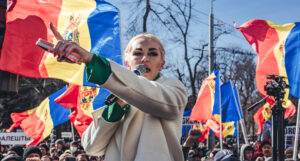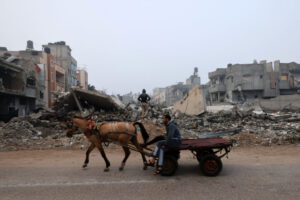Could another war be beginning in Europe? The past few weeks in Transnistria are worrying, not least because they are so familiar. The separatist government there is agitating against Moldova, accusing it of destroying the economy, and violating Transnistrian human rights and freedoms. If this is not a new war, it certainly suggests a widening of the existing one.
It all kicked off last week, when Transnistria adopted a resolution condemning Moldova for the “economic and political blockade” of the region. It then called on Russia, the UN, the OSCE and the EU to intervene and protect the rights of its people — around 460,000 Russians and Ukrainians and a sizable ethnic Moldovan minority.
Transnistria, the narrow strip of land running between Moldova’s eastern border with Ukraine, illegally broke away from Moldova in 1990 and is unrecognised as independent by almost all the world, including the UN. But not Russia, of course, which maintains two motorised rifle battalions there. And as Russia performatively heeds the breakaway republic’s “call”, memories of eastern Ukraine in 2014 are inescapable.
I was there after the EuroMaidan revolution in which Ukrainians overthrew their Kremlin-backed President, the corrupt, convicted criminal Viktor Yanukovych. Over the following weeks I travelled across the country talking to so-called Ukrainian “separatists” (backed by Russia, we now know) who were saying exactly the same thing as the Transnistrian government is now. They were, they told me, calling on Russia to come and “rescue” them. They wanted their indigenous rights protected from the government of the country they were legally a part of. It was nonsense then just as it is now in Moldova.
The catalyst for the Maidan Revolution in 2014 was Yanukovych’s last-minute refusal to sign the EU Accession Agreement in favour of Moscow’s Eurasian Customs Union. This year, on 7 February, Ilan Shor (a former Moldovan MP who is now sanctioned by US) went to Russia where he had a meeting with Leonid Kalashnikov who assured him that Moldova’s only chance of betterment was to join Eurasian Economic Union.
Gennady Chorba, a Transnistrian politician said his “government” will submit a request to the Kremlin to this effect during a special congress that last met in 2006. “This will be voiced to Russia on behalf of citizens living on the left bank of the Dniester River.” His statement came a few days after Sergei Lavrov, Russia’s foreign minister, said the rights of pro-Russian separatists in Transnistria must be respected. On 17 February, Russia relaxed its requirements for “compatriots” living abroad so that they do not now need to prove their Russian proficiency to resettle into Russia, so long as the individual was born in the former USSR.
Once again, the similarities with the situation in Ukraine are depressingly similar. In November 2023, Putin gave a speech referring to the concept of the “Russian world (Russkiy Mir)”: loosely speaking, people living in the former USSR, people who feel a “spiritual connection” to the motherland, people who consider themselves native Russian speakers, and people who are carriers of Russian history and culture – regardless of national affiliation. In reality, this means anyone the Kremlin would ideally like to annex, not least Ukrainians.
In 2014, before Russia sent in the tanks, they flooded eastern Ukraine with disinformation. I remember the memes and the tweets and posts on the contiguity of Russia and Ukraine, the perniciousness of the West (especially the EU and NATO) and the historical and cultural affinities and glories of Russkiy Mir. In this sense, even beyond Transnistria, Moldova is right in the Kremlin’s sights. And just like Crimea and the Donbas were never about just those regions, but the whole of Ukraine, this is also an operation directed against Moldova. It is the type of state that is in many ways guaranteed to give Putin a conniption: a former Soviet state that is also now a candidate for EU accession.
Moldova was granted status as candidate nation in June 2022 with the view to being a member nation by 2030. For the Kremlin, the prospect of Moldova joining the EU is almost as geopolitically and ideologically unacceptable as it was and is for Ukraine. What is happening now is merely the fruition of years (if not decades) of information and political subversion there (as across eastern Europe).
A few years ago, I traipsed across large parts of eastern Europe to assess the threat level of Russian information operations in the region — I wanted to know how the Russians were targeting the hearts and minds of the people there. As I sat in various dilapidated offices in Moldova listening to people delivering the various Russian narratives, it was clear that the Kremlin’s playbook was pretty rigid. It centred on a mythologising of Moldova’s soviet past: pointing to the supposedly elevated standards of living that both shared along with a glorious history. The inescapable fact, though, was Moldova’s weakness meant it couldn’t operate as a state without Russian help. Once more I could have been in Ukraine.
More narrowly, Russian disinformation narratives argued that the Moldovan government is a puppet of the EU and Nato and US. Europe is of course totally corrupt and a bastion of perversion in which corrupt officials are hankering to replace family values with LGBT rights. “What this means,” a fierce Moldovan journalist said to me, “is that they say if we join the EU our kids will be forced to become gay and it won’t be possible to beat your wife anymore.” I replied that this was surely couched in a more sophisticated language. “Barely,” she replied.
Like pretty much all former Soviet states, Moldova suffers from the twin curses of corruption and Kremlin influence. Politically, Moldovan politics remains vulnerable to its propaganda. In March 2022, just weeks after Russia’s all-out invasion, Ukraine banned its pro-Russia Regions Party, but in Moldova the pro-Russia Party of Socialists remains prominent in public life and has about a 20% share of the vote.
To make matters worse, the country has scant separation between politics and media. Former Democratic Party of Moldova leader and President Vladimir Plahotniuc, for example, have had significant media holdings, former President Igor Dodon has enjoyed close links with media oligarchs.
All the problems of Russian influence in Moldova can be cubed in Transnistria. For a start, its media space is separate. Broadcasts from the right bank of the Dniester are jammed, and the frequencies of Moldova TV broadcasters have been redistributed to rebroadcast Russian content. There are few purely Russian-language media in Moldova: Komsomolskaya pravda and Argumenty i Fakty (long-standing newspapers originating from Russian with licences in other post-soviet countries). Most are in two languages, Moldovan (Romanian) and Russian, or Moldovan (Romanian). It is a space into which Russia can broadcast more or less unopposed.
The Transnistrians are calling for Mother Russia. It will heed their call. This is how it begins. This is how it began in Ukraine. Moscow already has troops in the region, and sources tell me that the Russians have been sneaking what they call “saboteurs” into the region on flights.
But in the end, Transnistria as a region is of little importance to Russia beyond its ability to act as a garrison station on Ukraine’s southern border. But preventing Moldova from ever joining the EU and bringing it back into a new enlarged Russia are what most counts.
It is no coincidence that Putin is trying this when things on the battlefields seem to be turning in his favour, largely due to the delay in weapons from Kyiv’s allies.
This is the price of the West’s weakness: the war in Ukraine was never just about Russia and Ukraine, but wider Europe. We did not understand this when Putin invaded. But our failure to give Ukraine the means to fight most effectively has emboldened Putin. Now he has turned his eyes to Moldova — and we have only ourselves to blame.
Disclaimer
Some of the posts we share are controversial and we do not necessarily agree with them in the whole extend. Sometimes we agree with the content or part of it but we do not agree with the narration or language. Nevertheless we find them somehow interesting, valuable and/or informative or we share them, because we strongly believe in freedom of speech, free press and journalism. We strongly encourage you to have a critical approach to all the content, do your own research and analysis to build your own opinion.
We would be glad to have your feedback.
Source: UnHerd Read the original article here: https://unherd.com/



